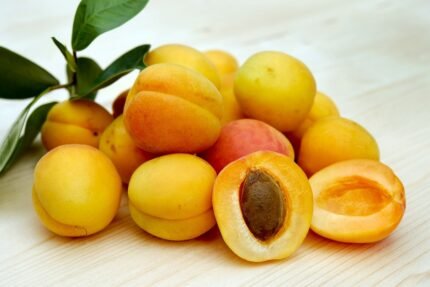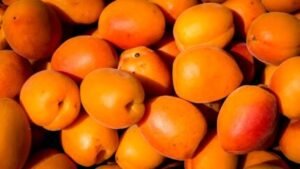Medically reviewed by Dr. Ramesh Gaddam, M.D. — Written by Sumalatha, D.N.H.E
Apricots, known as “Khubani” or “Khumani” or “Jardalu” in India, is a fruit that belongs to the Prunus genus and is closely related to peaches and plums.
Apricots are small, round fruits with a velvety skin. They are typically orange or yellow in color, with a slight blush on their surface. Apricots have a sweet, juicy, and slightly tart flavor. The texture of the flesh can range from firm to soft, depending on the ripeness.
Apricots are not only delicious but also packed with essential nutrients that offer numerous health benefits. Rich in vitamins A and C, fiber, and antioxidants, these vibrant fruits support eye health, improve digestion, and enhance skin vitality.
Their high antioxidant content helps combat free radicals, reducing the risk of chronic diseases. Additionally, apricots provide hydration and may aid in weight management due to their low-calorie count. Incorporating apricots into your diet can contribute to overall well-being and vitality.
Khubani (Apricots) Nutrition
Nutrition content of apricots (Khubani) per 100 grams:
| Nutrient | Amount per 100 grams |
|---|---|
| Calories | 48 kcal |
| Water | 86 grams |
| Protein | 1.4 grams |
| Carbohydrates | 11 grams |
| Dietary Fiber | 2 grams |
| Sugars | 9 grams |
| Fat | 0.4 grams |
| Vitamin A | 96% of the Daily Value (DV) |
| Vitamin C | 10% of the DV |
| Vitamin E | 6% of the DV |
| Potassium | 259 mg (7% of the DV) |
| Calcium | 13 mg (1% of the DV) |
| Iron | 0.39 mg (2% of the DV) |
| Magnesium | 10 mg (2% of the DV) |
| Phosphorus | 23 mg (3% of the DV) |
Health Benefits of Apricots
Khubani, or apricots, offer a range of health benefits due to their nutritional content and natural compounds. Here are some of the potential health benefits associated with the consumption of apricots:
Rich in Nutrients:
Apricots are a good source of essential vitamins and minerals, including vitamin A, vitamin C, vitamin E, potassium, and dietary fiber.
These nutrients are important for maintaining overall health and well-being.
Supports Eye Health:
Apricots are exceptionally high in vitamin A, which is essential for maintaining good vision and eye health.
Consuming apricots can help prevent eye conditions and improve night vision.
Aids Digestion:
The dietary fiber in apricots can aid in digestion by promoting regular bowel movements and preventing constipation.
It also helps maintain a healthy gut.
Boosts Immunity:
The combination of vitamin C and antioxidants in apricots can boost the immune system and help the body fight off infections and illnesses.
Heart Health:
Potassium in apricots is beneficial for heart health. It helps regulate blood pressure and can reduce the risk of hypertension and related cardiovascular diseases.
Skin Health:
Vitamin E in apricots is known for its role in maintaining healthy skin.
It can help protect the skin from damage caused by free radicals and UV radiation.
Antioxidant Properties:
Apricots contain antioxidants that can neutralize harmful free radicals in the body, reducing the risk of chronic diseases and cellular damage.
Bone Health:
Apricots provide important minerals like calcium and phosphorus, which are essential for maintaining strong and healthy bones.
Weight Management:
Apricots are low in calories and high in fiber, making them a good choice for those looking to manage their weight. The fiber helps promote a feeling of fullness.
Cancer Prevention:
Some research suggests that the antioxidants and phytochemicals found in apricots may have a role in reducing the risk of certain types of cancers.
Anti-Inflammatory:
Apricots contain compounds with potential anti-inflammatory properties, which can be beneficial for those with inflammatory conditions.
Hydration:
Apricots have a high water content, which can help keep you hydrated, especially in hot weather.
Allergic Reactions:
Some individuals may be allergic to apricots or other fruits in the same botanical family, such as peaches and plums.
Allergic reactions can range from mild symptoms like itching or hives to more severe symptoms like difficulty breathing.
If you have a known fruit allergy, it’s important to avoid apricots.
Gastrointestinal Issues:
Eating too many apricots, particularly in their dried form, can lead to gastrointestinal problems such as diarrhea, bloating, or abdominal discomfort. This is often due to the high fiber and sugar content in apricots.
Tooth Decay:
Dried apricots can be sticky and high in natural sugars, which may contribute to tooth decay if consumed in excess.
Proper dental hygiene is essential.
Cyanide Risk from Pits:
The pits (stones) of apricots, like those of other stone fruits, contain a compound called amygdalin that can release cyanide when ingested in large quantities.
Swallowing or chewing the pits is not safe. However, the flesh of the fruit itself is not a source of cyanide and is safe to eat.
Medication Interactions:
If you are taking certain medications, particularly blood-thinning medications like warfarin, consuming large amounts of apricots could affect your blood’s clotting ability.
Apricots contain vitamin K, which can interfere with the action of blood thinners.
Kidney Stones:
Some people with a history of kidney stones may need to moderate their consumption of apricots,
as they contain oxalates, which could contribute to the formation of kidney stones in susceptible individuals.
FODMAPs:
Apricots contain fructose and sorbitol, which are FODMAPs (fermentable oligosaccharides, disaccharides, monosaccharides, and polyols).
People with irritable bowel syndrome (IBS) or sensitivities to FODMAPs may experience digestive discomfort when consuming apricots.
Fresh Consumption:
Apricots can be enjoyed as a fresh and healthy snack. Simply wash, slice, and eat them as a refreshing treat.
Dried Apricots:
Dried apricots are a popular and convenient snack. They are widely available and are often used in trail mixes, granola bars, and as a natural sweetener in various recipes.
Baking:
Apricots can be used in baking a variety of dishes, including pies, tarts, cakes, and muffins. Dried apricots are commonly used in baking, adding natural sweetness and texture to recipes.
Preserves and Jams:
Apricot preserves and jams are a classic way to enjoy the flavor of apricots. They can be spread on toast, used as a condiment, or incorporated into various dessert recipes.
Desserts:
Apricots can be used to create a range of delicious desserts, including apricot cobbler, crisps, sorbet, and ice cream. They pair well with other fruits and can be used in fruit salads.
Sauces:
Apricots can be turned into savory and sweet sauces that complement a variety of dishes. Apricot sauces are often used in recipes for glazing meats, such as chicken or pork.
Chutneys:
Apricot chutney is a flavorful condiment that can be served with a variety of dishes, including curries, grilled meats, and cheese platters.
Smoothies:
Fresh or frozen apricots can be blended into smoothies, adding a sweet and tangy flavor, as well as a dose of vitamins and antioxidants.
Salads:
Sliced apricots can be added to green salads or grain-based salads to provide a burst of natural sweetness and contrast to the other ingredients.
Compotes:
Apricot compotes can be made by cooking apricots with a sweetener, such as sugar or honey. These can be served on their own, with yogurt, or as a topping for desserts.
Canning:
Apricots can be canned to preserve their freshness. Canned apricots can be used in recipes or enjoyed as a standalone snack.
Liqueurs:
Apricot liqueurs and brandies are made using apricots and are enjoyed as alcoholic beverages or used in cocktails and desserts.
Meat Marinades:
The natural sweetness and acidity of apricots make them a good choice for marinades for meats like chicken, pork, and lamb.
Baby Food:
Apricots are a common ingredient in commercial baby foods and can also be prepared at home for infants.
Herbal Teas:
Dried apricots can be used to make apricot-flavored herbal teas when combined with other herbs or botanicals.
Apricots in Indian Languages
In India, apricots are known by various names in different languages and regions. Here are some of the common names for apricots in Indian languages:
- Hindi: In Hindi, apricots are called “Khubani” (खुबानी).
- Marathi: In Marathi, they are known as “Jardalu” (जर्दाळू).
- Kannada: In Kannada, apricots are referred to as “Jardalu” (ಜಾರ್ಡಾಳು).
- Tamil: In Tamil, they are called “Sarakku” (சரக்கு) or “Chirru” (சிரு).
- Telugu: In Telugu, apricots are known as “Jardaloo” (జర్డాలూ).
- Bengali: In Bengali, they are referred to as “Khurmani” (খুরমানি).
- Gujarati: In Gujarati, apricots are called “Jardalu” (જરદાળુ).
- Punjabi: In Punjabi, they are known as “Khubani” (ਖੁਬਾਨੀ).
- Odia: In Odia, they are called “Khurmani” (ଖୁରମାଣି).
- Malayalam: In Malayalam, apricots may be referred to as “Sarakka” (സരക്ക).
These names may vary slightly in pronunciation and spelling based on regional dialects and accents, but they all refer to the same delicious fruit, the apricot.
References:
1. Apricots are full of antioxidants, which help stave off chronic diseases and promote overall health, including benefits for the eyes, skin, and gut[1].
2. They are particularly rich in vitamin A and beta-carotene, which are essential for eye health and may help protect against age-related macular degeneration[1][2].
3. Apricots provide dietary fiber that supports digestive health and helps prevent constipation[2][4].
4. The high potassium content in apricots aids in regulating blood pressure and supports heart health[2][4].
5. Dried apricots are a good source of iron, which can help prevent anemia by improving blood flow[4][5].
6. The antioxidants in apricots, including vitamins C and E, contribute to skin health by protecting against sun damage and promoting collagen production[4][5].
7. Their low glycemic index makes apricots suitable for people managing blood sugar levels[4].
[1] Apricot health benefits by cleveland clinic
[2] https://www.healthline.com/nutrition/apricots-benefits
[3] https://pharmeasy.in/blog/ayurveda-uses-benefits-side-effects-of-apricot/
[4] https://www.medicinenet.com/9_health_and_nutrition_benefits_of_apricots/article.htm
[5] https://www.health.com/apricots-benefits-7564194
Also Read:
Medically reviewed by Dr. Ramesh Gaddam, M.D.

General Physician, Diabetologist, and Critical Care Specialist.
Discover more from Health Build-Up
Subscribe to get the latest posts sent to your email.




2 thoughts on “10 Nutritional Health Benefits of Khubani (Apricots)”
Comments are closed.